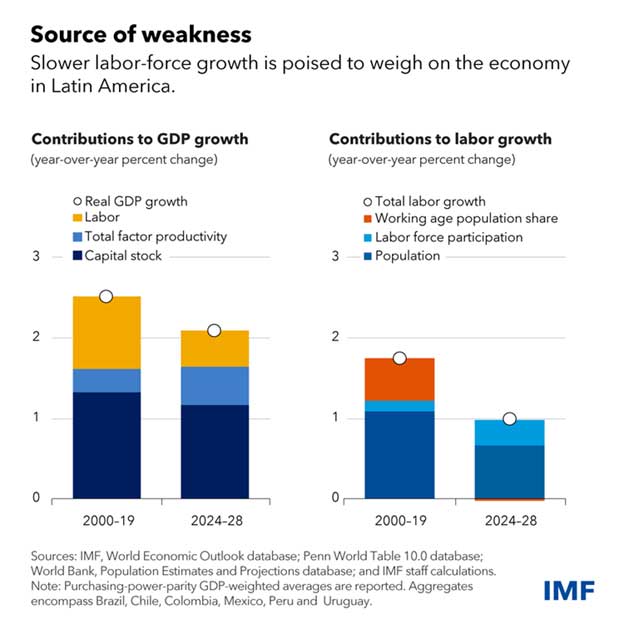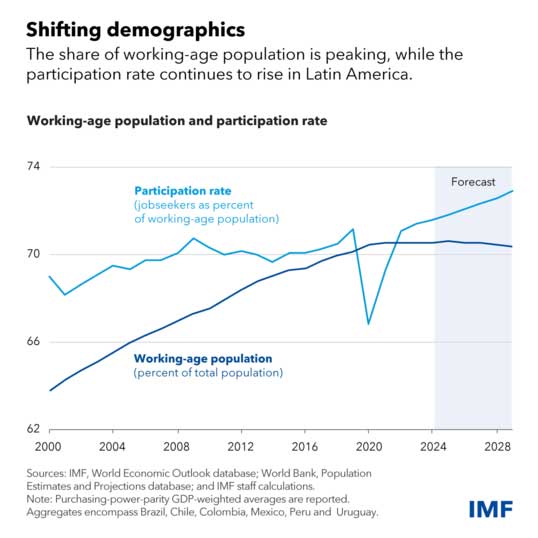WASHINGTON DC, Apr 29 (IPS) – Latin America’s workforce grew by practically 50 p.c within the 20 years earlier than the pandemic, serving to increase financial development. Now demographic traits are turning, and prone to weigh on development within the coming years.
We anticipate development in Latin America to common about 2 p.c per 12 months within the subsequent 5 years, under its already low historic common. These projections are additionally significantly weaker than these for different rising market economies throughout Europe and Asia, that are additionally anticipated to sluggish however nonetheless develop by 3 p.c and 6 p.c yearly, respectively.
This weaker outlook social gathering displays long-standing challenges of low funding and sluggish productiveness development. The extra problem this time is that the demographics are turning, and the labor power gained’t develop as quick as earlier than.
Turning Demographics
Inhabitants development will proceed decelerating, falling from about 1 p.c per 12 months within the 20 years previous the pandemic to about 0.6 yearly within the subsequent 5 years. This isn’t essentially unhealthy information as a rising inhabitants doesn’t robotically imply rising earnings per capita—essentially the most related measure of wellbeing.
Though a bigger inhabitants means a bigger labor power and combination output, it additionally means a bigger variety of individuals amongst whom output is shared. Nonetheless, rising the financial system by a bigger inhabitants may also help in different methods, together with by rising revenues to repay excessive debt ranges.

Extra importantly, the demographic dividend is fading because the area’s inhabitants is growing older and the share of the working-age inhabitants is peaking. Which means that the share of the inhabitants capable of generate earnings will cease rising. It is a vital change as this share had been rising till now, enabling the labor power to develop 0.5 p.c per 12 months since 2000. In distinction, we anticipate no development within the share of working-age inhabitants over the following 5 years, on common.
Boosting participation
Holding the labor power engine working would require boosting labor power participation. And a few of that is anticipated to occur, because the share of working-age jobseekers is projected to proceed rising.
However for this to turn out to be a actuality, it will likely be key to additional combine ladies into the labor power. Their participation stays low, at solely 52 p.c of working-age ladies in comparison with 75 p.c of males.

Insurance policies may also help. Increasing childcare applications and offering extra coaching for ladies may also help elevate feminine participation, as now we have mentioned in current nation experiences, together with for Brazil and Mexico.
Guaranteeing that family taxation doesn’t discourage secondary family earners and eliminating uneven childcare and parental depart advantages between women and men, that in the end discourage hiring of ladies or have an effect on their pay, may also assist deliver extra ladies into the labor power.
Nations may also develop their workforce by offering vocational coaching alternatives, elevating the retirement age, eliminating disincentives for work after retirement and adopting insurance policies that facilitate employment of older staff.
Tackling crime—an essential issue behind migrant outflows in some elements of the area—also needs to be on the agenda.
But additionally, as demographics turn out to be much less favorable, nations might want to put extra effort into elevating labor productiveness development, by tackling poor governance, stringent enterprise laws, and widespread casual work (which constrains corporations’ development and the related productiveness features).
This can assist elevate residing requirements even amid demographic headwinds.
Latin America’s a few years of arduous work to strengthen macroeconomic frameworks has paid off. Nations efficiently navigated the final two massive world financial recessions and averted a painful repeat of previous crises.
Now they have to make the most of this resilience to deal with boosting potential development, a persistent problem that’s mounting as demographic fortunes flip.
Supply: Worldwide Financial Fund (IMF)
IPS UN Bureau
Observe @IPSNewsUNBureau
Observe IPS Information UN Bureau on Instagram
© Inter Press Service (2024) — All Rights ReservedUnique supply: Inter Press Service
